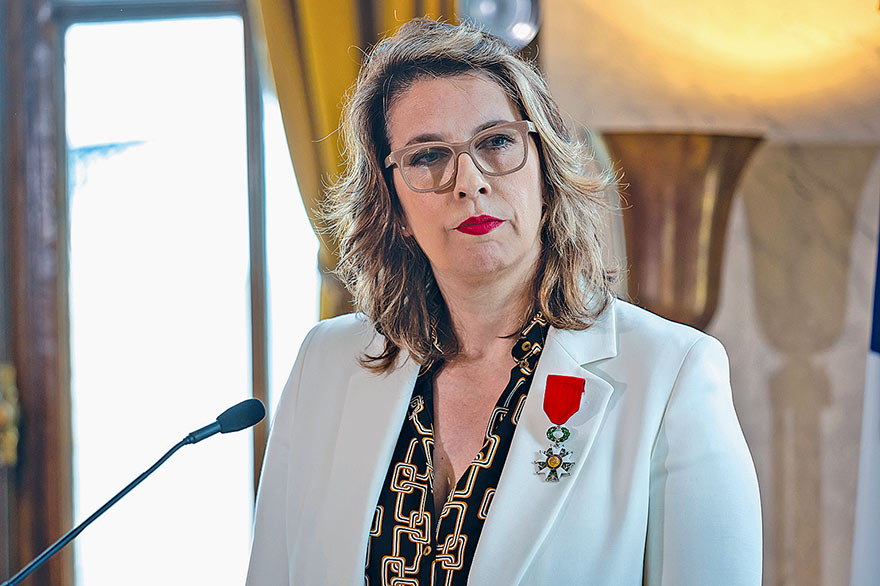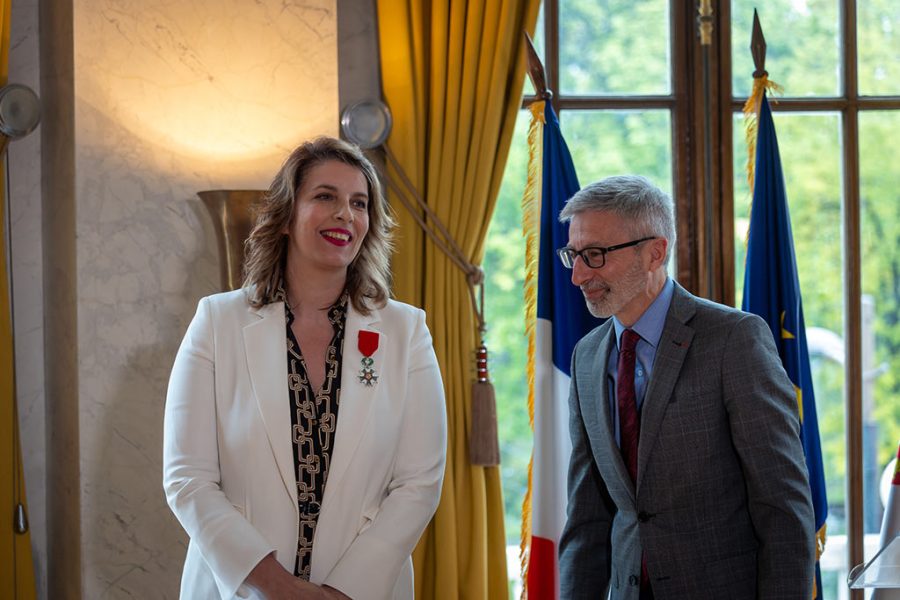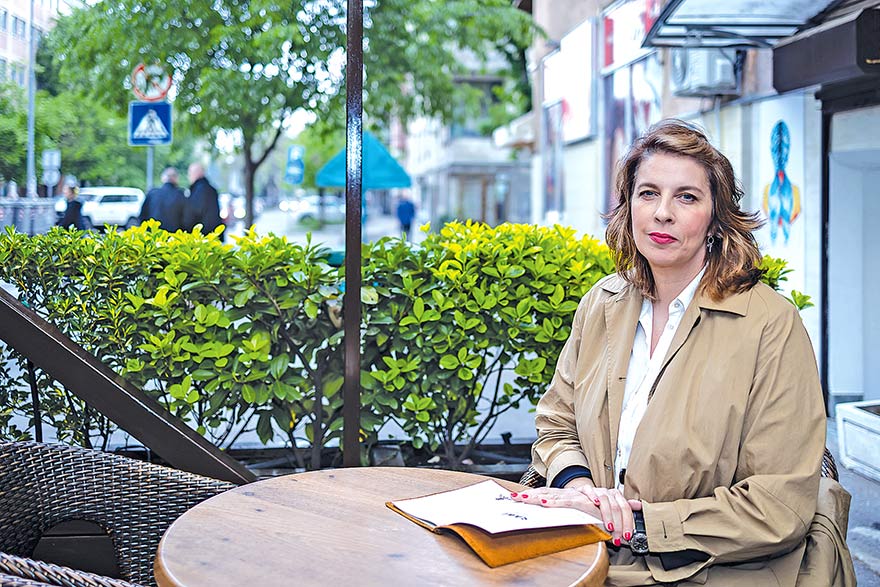The issue of honour is today treated like a virtue of bygone times, and is really ever less associated with the notion of journalists, because some other traits, first and foremost adaptability, are becoming more important – and I would say according to the same principle through which resourcefulness trumps knowledge. That’s why journalism, as a profession, no longer has the kind of respect it had in the times prior to me deciding to pursue this career. I still believe that all’s not lost. In times of crisis, and we’re living in such times, it turns out that the public, bombarded with information and messages telling it what to think from all sides, still looks to journalists whose work has earned them the status of an authority. That is both a badge of honour and an obligation for a journalist
When news was announced that Ljubica Gojgić had been awarded the French Order of the Legion of Honour in the rank of Knight, the vast majority of the Serbian public were in general agreement that, this time around, this highest recognition had been placed in the right hands. That’s because of everything she’s done to date, at NIN, B92, Radio-Television Vojvodina, on the Serbian media scene, as a permanent associate of CorD Magazine, Ljubica is justifiably known as a gauge of the values of Serbian journalism. Her articles, shows, concluding with the Right Angle on RTV Vojvodina, represent the consistent defence of democratic values in society.
Raised in a house where television occupied an important place and newspapers were also available, her interest in them only came later. From her early childhood, she recalls children’s TV shows Kockica, Poletarac, and later the full school programme, the legendary David Bellamy, then Survival and Vladeta Janković’s stories about history… Years later, she would converse with Janković in political interviews. Also unavoidable was the Dnevnik daily news bulletin, the drama programme of TV Belgrade on Mondays, BBC television series. Perhaps her journalistic ambitions also developed back then, without her even being aware of it. And when she thinks about it today, that’s actually the only profession that she really fell in love with as her choice.
Representing a great role model at the beginning of her journalistic career was Ljuba Stojić, who accepted Ljubica into his group of young novices at NIN, for whom he opened the door to the world of journalism as an editor, mentor and friend.

The Gojgić family, as well as the Jovanovićs on her mother’s side, hail originally from Zlatibor. The first family settled in Požega, with the other moving to Užice. That’s how she came to spend her entire childhood in those two cities, between the houses of grandfathers Marko Gojgić and Milisav Jovanović. And while the Jovanovićs, who were a generation younger, represented a tangible source of love and support in her life and had an essential influence on her upbringing and attitude towards life, the Gojgićs had more of a memorial nature from the beginning, as her grandfather Marko, a veteran of the Salonika front, passed away when she was a child.
However, the memory of him remained very vivid, as it was preserved by the entire family, with stories about his life and the Golgotha that he’d endure in the Great War.
She’s proud of both families, because she’s aware that those two homes formed her views on the world and the values that she considers as being most important in life, which are honesty and compassion, which were passed down to her gently and lovingly by her Jovanovićs and Gojgićs.
The required media freedom is the minimum a society creates with an awareness of the fact that, without high-quality journalism, there can be no quality opinions or the required social dialogue. Sufficient media freedom is an ideal to which both journalists and the public aspire. Sufficient media freedom is another name for the constant struggle between public interest and the ambitions of powerful interest groups. Real journalists always wear the shirt of the underdogs in that struggle
And that’s why it’s no surprise that when she recently received the Order of the Legion of Honour in the rank of knight from French Ambassador to Serbia Pierre Cochard, Ljubica expressed her gratitude and clearly summarised her professional credo, but also stated the following.
“I was born into a family in which respect and love for France are inherited! Like eye colour or head shape, or the maxim that you can’t put a price on justice. My childhood and life were marked by the memory of my grandfather, who endured the Golgotha of World War I and upon returning to Požega, recalling a great alliance, spent the rest of his life speaking about having two homelands: Serbia and France. This strong, emotional closeness is strengthened by today’s ceremony and this French order that arrives on the chest of a member of the Gojgić family. In memory of those whose heroism enabled us to live freely, and who left us with the obligation to defend the values for which they fought.”
What makes this Legion of Honour award special to you, compared to other equally valuable awards that you’ve already received?
The French recognition bestowed on me is the first representing the recognising of my work by a foreign country, and that’s why it’s special. I’m truly honoured by the fact that my work is also recognised as a contribution to our struggle, primarily for democracy and freedom of thought. It’s dear to me to find myself in the club of knights that already includes my fellow journalists Zoran Sekulić, Olja Bećković and Veran Matić.

I wouldn’t like this to be taken as an empty phrase, but in our work every individual award is also recognition that’s shared with colleagues, with those from whom you learn, who shape you as a journalist, with those who tenaciously defend the profession and affirm its values. Finally, because France is in my heart, and that’s a love that I inherited, this French recognition prompted a lot of completely personal emotions.
The inclusion of the word ‘honour’ in the name of an award is itself a rarity today. What does it mean to be an honourable journalist in Serbia and around the world today?
The issue of honour is today treated like a virtue of bygone times, and is really ever less associated with the notion of journalists, because some other traits, first and foremost adaptability, are becoming more important – and I would say according to the same principle through which resourcefulness trumps knowledge. That’s why journalism, as a profession, no longer has the kind of respect it had in the times prior to me deciding to pursue this career. I still believe that all’s not lost. In times of crisis, and we’re living in such times, it turns out that the public, bombarded with information and messages telling it what to think from all sides, still looks to journalists whose work has earned them the status of an authority. That is both a badge of honour and an obligation for a journalist.
The Hague experience was very important to my career, even though it was fairly disappointing, in terms of value. I think the tribunal in The Hague missed the opportunity to contribute in a just way to resolving the Yugoslav crisis and reconciling former compatriots. Fortunately, reconciliation is an inexorable process, because it is the passage of time and continuing life that unites people, both the old and particularly the young
What is media freedom today; how do you live it?
Media freedom is an ideal that’s conquered again and again with each new generation of journalists. A legacy that’s constantly under attack, by undemocratic regimes and those standing under the flag of liberalism and tolerance. Both politicians and commercial elites. Media freedom is primarily also an opportunity to do the job you love, which isn’t easy in the slightest, and then the freedom to have only the dictates of your work as the highest standards of the journalistic profession and a sense of obligation to the public interest. Journalists who’ve made that choice ordinarily aren’t “stars” in today’s tacky showbiz sense, nor has journalism made them rich. But if they fought and won that kind of freedom, they’ve earned the right to enjoy one of the most exciting professions in existence.
Is there a sufficient degree of media freedom?
The required media freedom is the minimum a society creates with an awareness of the fact that, without high-quality journalism, there can be no quality opinions or the required social dialogue. Sufficient media freedom is an ideal to which both journalists and the public aspire. Sufficient media freedom is another name for the constant struggle between public interest and the ambitions of powerful interest groups. Real journalists always wear the shirt of the underdogs in that struggle.

There isn’t a single relevant politician on the Serbian political scene that you haven’t interviewed. Is there a common trait that unites politicians today?
They are united by a need, during their moments of greatest popularity or power, to turn away from the principles for which they advocated when they were less powerful. They also share the belief that power brings the right to listen to others less, or for them to be held accountable. In Serbia, they are similar in terms of their bigotry towards the media, which is always present and differs only in terms of nuance.
You reported from the ICTY in The Hague, covering the trials of those accused of war crimes on the territory of the former Yugoslavia. What was Yugoslavia to you?
In my life, Yugoslavia is more a recollection of early childhood, which is understandably coloured in tones of innocence and naivety. When I’d grown enough to start thinking something about the world in which I live, Yugoslavia had already been hit by crisis and then collapsed. The trials in The Hague were one of the epilogues of the bloody wars that disappeared in the process. The Hague experience was very important to my career, even though it was fairly disappointing, in terms of value. I think the tribunal in The Hague missed the opportunity to contribute in a just way to resolving the Yugoslav crisis and reconciling former compatriots. Fortunately, reconciliation is an inexorable process, because it is the passage of time and continuing life that unites people, both the old and particularly the young.
How do you interpret the often harsh accusations levelled against all those who have happy memories of the country in which they were born and spent a long time living their lives?
I observe them in the context of the prevailing mood in society that we have conflict instead of dialogue. On every possible subject, from Yugoslav nostalgia to Novak Đoković. I see them as a lack of understanding and tolerance for attitudes and feelings that aren’t similar to ours. Yugoslavia isn’t only part of our lives, but also part of our history, and it cannot be abolished or cancelled, which is today a popular way of treating subjects that people aren’t prepared to discuss.
Among a section of journalists and the general public, it [political correctness] is imposed as proof of political orthodoxy… I recognise correctness only as an obligation to respect the rules of the profession, the journalistic code, to talk politely to people, with compassion in situations requiring that. Political correctness, or social intelligence, as it is often called, is a sure route to selfcensorship
How do you perceive the ruling system of values, both in the world and in Serbia?
The system of values on which my generation was raised has come under attack both around the world and in Serbia. In that famous “pioneer’s oath” that was part of our upbringing, mention was made of honour and diligent study, respect for parents and elders, the importance of friendship, the obligation accepted with a given word. What else could be added to that and why is that act and text so often subjected to ridicule? Translated into today’s situation, a journalism student once asked me, in response to my insistence that all information be checked well before being sent into the ether: “Do you even watch today’s media?”
He correctly recognised that he was being taught something that in reality either doesn’t exist or is ever less present, but it’s important to know that life, and journalism, can and must look different. At the end of the day, new generations will have to participate in the value “reset” that’s so essential for our journalism.
What in the ruling system that we live in today is most destructive for humans, as thinking beings?
The giving up of that unique gift of being able to think. Of having the right to know, having a way to discover and their own attitude about what they’ve discovered. It’s concerning that fear is stronger than attitude, even in situations where there’s no real reason or justification for that fear. On the other hand, the devaluation of knowledge is also worrying, as is the ease with which everything is considered, and publicly, without any knowledge whatsoever.
To what extent has the notion of political correctness today been turned into its own polar opposite?
That concept was distant to me even during those times when it didn’t have such a glamorous formulation, but was simply recognised as courteousness. Among a section of journalists and the general public, it is imposed as proof of political orthodoxy, correctness and even a qualification for one to continue to be an interlocutor in a discussion, i.e., as a theatre backdrop tasked with hiding a lack of courage without which there can be no journalism. I recognise correctness only as an obligation to respect the rules of the profession, the journalistic code, to talk politely to people, with compassion in situations requiring that. Political correctness, or social intelligence, as it is often called, is a sure route to self-censorship.